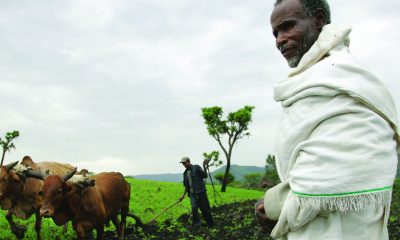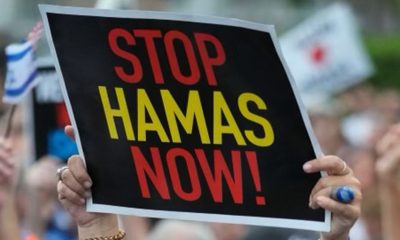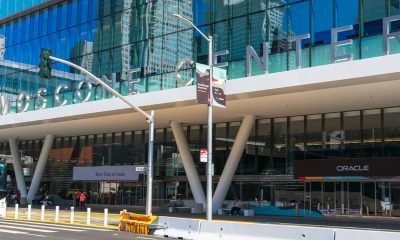World
US Lets in Thai Fish Caught by Slaves Despite Law

In this Nov. 2014, file photo, workers in Benjina, Indonesia, load fish onto a cargo ship bound for Thailand. In its first report on trafficking around the world, the U.S. criticized Thailand as a hub for labor abuse. Yet 14 years later, seafood caught by slaves on Thai boats is still slipping into the supply chains of major American stores and supermarkets. (AP Photo/Dita Alangkara, File)
MARTHA MENDOZA, Associated Press National Writer
WASHINGTON (AP) — In its first report on trafficking around the world, the U.S. criticized Thailand as a hub for labor abuse. Yet 14 years later, seafood caught by slaves on Thai boats is still slipping into the supply chains of major American stores and supermarkets.
The U.S. has not enforced a law banning the import of goods made with forced labor since 2000 because of significant loopholes, The Associated Press has found. It has also spared Thailand from sanctions slapped on other countries with weak records in human trafficking because of a complex political relationship that includes cooperation against terrorism.
The question of how to deal with Thailand and labor abuse will come up at a congressional hearing Wednesday, in light of an AP investigation that found hundreds of men beaten, starved, forced to work with little or no pay and even held in a cage on the remote island village of Benjina. While officials at federal agencies would not directly answer why the law and sanctions are not applied, they pointed out that the U.S. State Department last year blacklisted Thailand as among the worst offenders in its report on trafficking in people worldwide.
Phil Robertson, deputy director of Human Rights Watch’s Asia division, said the plight of about 4,000 forced laborers in Thailand’s seafood industry can no longer go unheeded. Many are migrant workers from Myanmar and other countries who were forced to work on Thai boats in Indonesian waters.
“There have been problems with systematic and pervasive human trafficking in Thailand’s fishing fleets for more than a decade, but Washington has evidently considered it too hard to find out exactly what was happening and is not taking action to stop it,” he said. “No one can claim ignorance anymore. This is a test case for Washington as much as Bangkok.”
Hlaing Min, a 32-year-old migrant fisherman from Myanmar who worked around the clock for more than two years before he ran away, also begged the U.S. for help.
“Basically, we are slaves — and slavery is the only word that I can find — but our condition is worse than slavery,” he said. “On behalf of all the fishermen here, I request to the congressmen that the U.S. stop buying all fish from Thailand. … This fish, we caught it with our blood and sweat, but we don’t get a single benefit from it.”
The AP investigation tracked fish caught by slaves to the supply chains of large food sellers such as Wal-Mart, Sysco and Kroger, as well as popular brands of canned pet food such as Fancy Feast, Meow Mix and Iams. The companies all said they strongly condemn labor abuse and are taking steps to prevent it. While some human rights advocates say boycotts are effective, many U.S. seafood companies say cutting off all imports from an entire country means they no longer have any power to bring about change.
During a recent visit to Jakarta, State Department Undersecretary Catherine A. Novelli was asked what the U.S. would now do.
“I’m sure that your public would be concerned that the fish that they ate came from a slave,” said an Indonesian reporter.
Novelli’s response was quick.
“In the United States we actually have a law that it is illegal to import any product that is made with forced labor or slave labor, and that includes fish,” she said. “To the extent that we can trace … where the fish are coming from, we won’t allow fish to come into the United States that has been produced with forced labor or slavery.”
However, the Tariff Act of 1930, which gives Customs and Border Protection the authority to seize shipments where forced labor is suspected and block further imports, has been used only 39 times in 85 years. In 11 cases, the orders detaining shipments were later revoked.
The most recent case dates back to 2000, when Customs stopped clothing from Mongolian firm Dong Fang Guo Ji based on evidence that factory managers forced employees, including children, to work 14-hour days for low wages. The order was revoked in 2001, after further review found labor abuse was no longer a problem at the company.
Detention orders that remain in place can have mixed results.
In 1999, Customs blocked hand-rolled unfiltered cigarettes from the Mangalore Ganesh Beedie Works in India, suspecting child labor. However, the AP found that Mangalore Ganesh has sent 11 large shipments of the cigarettes to Beedies LLC of Kissimee, Florida, over the past four years through the ports of New York, Miami and Savannah, Georgia. Beedies LLC said the cigarettes go straight from the U.S. ports to a bonded warehouse, and are then exported outside the country.
To start an investigation, Customs needs to receive a petition from anyone — a business, an agency, even a non-citizen — showing “reasonably but not conclusively” that imports were made at least in part with forced labor. But spokesman Michael Friel said that in the last four years, Customs has received “only a handful of petitions,” and none has pointed to seafood from Thailand. The most recent petition was filed two years ago by a non-profit against cotton in Uzbekistan.
“These cases often involve numerous allegations that require extensive agency investigation and fact-finding,” he said.
Experts also point to two gaping loopholes in the law. Goods made with forced labor must be allowed into the U.S. if consumer demand cannot be met without them. And it’s hard, if not impossible, to prove fish in a particular container is tainted, because different batches generally mix together at processing plants.
Former Justice Department attorney Jim Rubin said Customs can’t stop trafficked goods without the help of other federal agencies to investigate overseas.
“You can’t expect a Customs guy at the border to know that a can of salmon caught on the high seas was brought in by a slave,” he said.
The U.S. response to Thailand is also shaped by political considerations.
For years, the State Department has put Thailand on the watchlist in its annual trafficking report, saying the Thai government has made efforts to stop labor abuse. But last year, after several waivers, it dropped Thailand for the first time to the lowest rank, mentioning forced labor in the seafood industry. Countries with the same ranking, such as Cuba, Iran and North Korea, faced full sanctions, and foreign aid was withheld. Others, like Sudan, Syria and Zimbabwe, faced partial sanctions.
Thailand did not: U.S. taxpayers provided $18.5 million in foreign aid to the country last year.
“If Thailand was North Korea or Iran, they’d be treated differently,” said Josh Kurlantzick, a fellow for Southeast Asia at the Council on Foreign Relations. “They’re a key ally and we have a long relationship with them.”
In the 1960s and ’70s, when the U.S. needed Thailand’s help in the Vietnam War, the country “got a pass on everything,” Kurlantzick said. Then Thailand’s record on human rights gradually improved, along with its economy. That changed dramatically in 2006, when the military first ousted the prime minister. It declared martial law and then overtook the government again last year.
In response, the U.S. condemned the current regime and has suspended $4.7 million in military funding to the Southeast Asian nation.
However, the U.S. still includes Thailand in military exercises, and the country is considered a critical ally against terrorism. A U.S. Senate report in December detailed how top al-Qaida suspect Abu Zubaydah was waterboarded, slammed into a wall and isolated at a secret safe house in Thailand as part of CIA interrogations in 2002. And in 2003, a senior al-Qaida operative was arrested outside Bangkok after more than 200 people died in a Bali nightclub bombing.
The U.S. also wants strong relations with Thailand as a counterweight to China, whose influence is growing in the region.
Along with the State Department, the Labor Department has also flagged seafood from Thailand year after year as produced by forced labor in violation of international standards. Department of Homeland Security senior policy adviser Kenneth Kennedy referred to discussions for an action plan on labor abuse in Thailand that began in the fall.
“I think the U.S. government recently has realized that we need to pay attention to this area,” he said. “We need to address conditions that have been reported for years and that are in the public minds and in the public eye very much.”
Thailand itself says it is tackling labor abuse. In 2003, the country launched a national campaign against criminal organizations, including traffickers. In 2008, it adopted a new anti-human trafficking law. And last month, the new junta government cited the fight against trafficking as a national priority.
“This government is determined and committed to solving the human trafficking issues, not by words but by actions,” deputy government spokesman Maj. Gen. Sansern Kaewkamnerd said. “We are serious in prosecuting every individual involved in the network, from the boats’ captains to government officials.”
However, a Thai police general on a fact-finding mission earlier this month to Benjina declared conditions were good and workers “happy.” A day later, Indonesian authorities rescued more than 320 abused fishermen from the island village, and the number of workers waiting to be sent home has since risen to more than 560.
Under United Nations principles adopted in 2011, governments must protect against human rights abuses by third parties. However, some local authorities in Thailand are themselves deeply implicated in such practices, said Harvard University professor John Ruggie, who wrote the principles, known as the “Ruggie Framework,” as a U.N. special representative. Also, Thailand’s seafood industry, with annual exports of about $7 billion, is big business for the country and depends on migrant labor.
Migrant fishermen rescued from Benjina were bewildered to learn that their abuse has been an open secret for years. Maung Htwe, a 26-year-old migrant worker from Myanmar, did backbreaking work for Thai captains in Indonesian waters over seven years, earning less than $5 a day, if he was lucky.
“Sometimes I’m really angry. It’s so painful. Why was I sold and taken to Indonesia?” asked Htwe, who was among the workers rescued from Benjina. “If people already knew the story, then they should have helped us and taken action.”
___
AP reporter Thanyarat Doksone contributed from Thailand.
Copyright 2015 The Associated Press. All rights reserved. This material may not be published, broadcast, rewritten or redistributed.
Barbara Lee
Congresswoman Barbara Lee Issues Statement on Deaths of Humanitarian Aid Volunteers in Gaza
On April 2, a day after an Israeli airstrike erroneously killed seven employees of World Central Kitchen (WCK), a humanitarian organization delivering aid in the Gaza Strip, a statement was release by Rep. Barbara Lee (D-CA-12). “This is a devastating and avoidable tragedy. My prayers go to the families and loved ones of the selfless members of the World Central Kitchen team whose lives were lost,” said Lee.

By California Black Media
On April 2, a day after an Israeli airstrike erroneously killed seven employees of World Central Kitchen (WCK), a humanitarian organization delivering aid in the Gaza Strip, a statement was release by Rep. Barbara Lee (D-CA-12).
“This is a devastating and avoidable tragedy. My prayers go to the families and loved ones of the selfless members of the World Central Kitchen team whose lives were lost,” said Lee.
The same day, it was confirmed by the organization that the humanitarian aid volunteers were killed in a strike carried out by Israel Defense Forces (IDF). Prior to the incident, members of the team had been travelling in two armored vehicles marked with the WCF logo and they had been coordinating their movements with the IDF. The group had successfully delivered 10 tons of humanitarian food in a deconflicted zone when its convoy was struck.
“This is not only an attack against WCK. This is an attack on humanitarian organizations showing up in the direst situations where food is being used as a weapon of war. This is unforgivable,” said Erin Gore, chief executive officer of World Central Kitchen.
The seven victims included a U.S. citizen as well as others from Australia, Poland, the United Kingdom, Canada, and Palestine.
Lee has been a vocal advocate for a ceasefire in Gaza and has supported actions by President Joe Biden to airdrop humanitarian aid in the area.
“Far too many civilians have lost their lives as a result of Benjamin Netanyahu’s reprehensible military offensive. The U.S. must join with our allies and demand an immediate, permanent ceasefire – it’s long overdue,” Lee said.
Bay Area
Nigerian Bank Chief Killed in Helicopter Crash on Way to Superbowl XVIII
According to the San Bernardino County Sheriff’s Dept., the crash occurred near Nipton, on the edge of the Mojave Desert Preserve. The poor weather conditions — rain, wind and snow showers—may have contributed to the accident, although the investigation is not complete. All six aboard were killed. Herbert Wigwe, 57, founded Access Bank in 1989, and it became the country’s largest competitor, Diamond Bank in 2018.
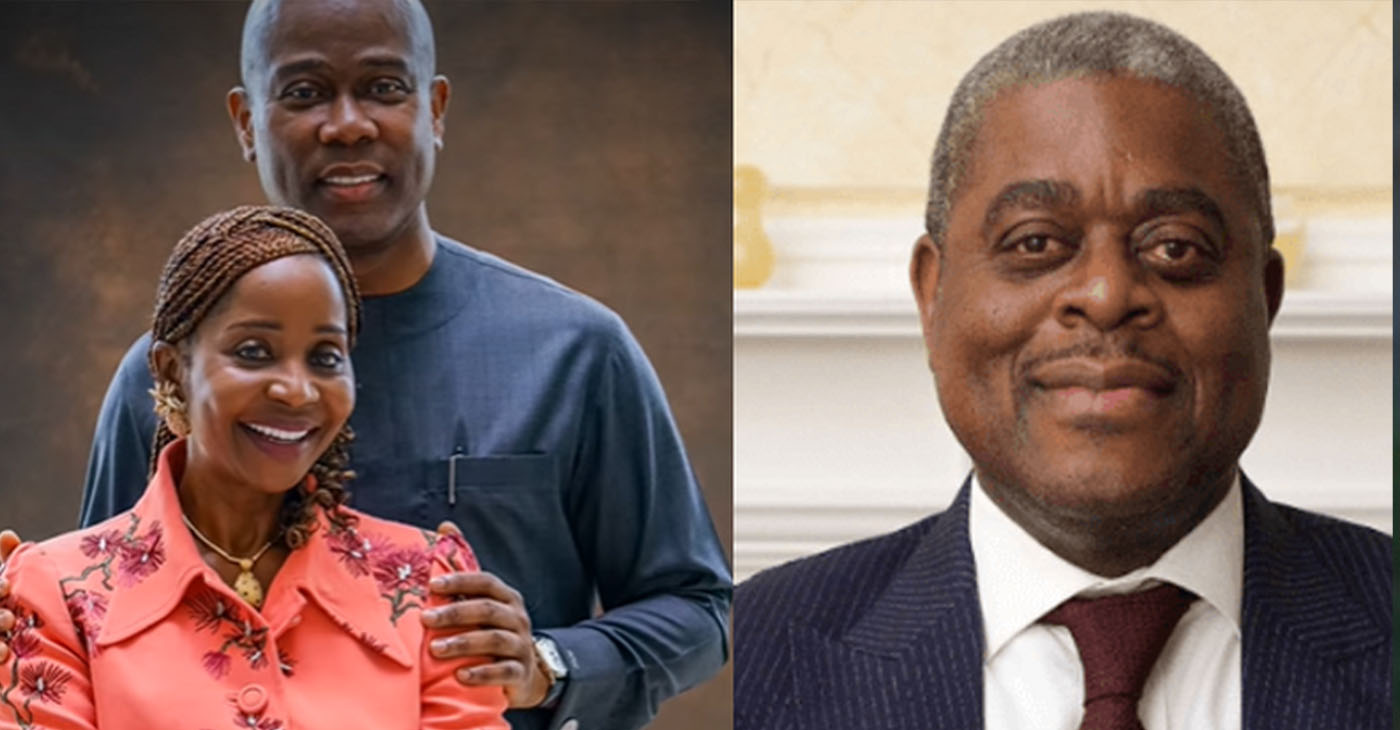
By Post Staff
The co-founder of one of Nigeria’s largest banks died with his wife, son and three others when the helicopter transporting them from Palm Springs, Ca., to Boulder City, Nev. to attend the fifty-eighth SuperBowl at the stadium outside Las Vegas crashed on Feb. 9.
According to the San Bernardino County Sheriff’s Dept., the crash occurred near Nipton, on the edge of the Mojave Desert Preserve. The poor weather conditions — rain, wind and snow showers—may have contributed to the accident, although the investigation is not complete. All six aboard were killed
Herbert Wigwe, 57, founded Access Bank in 1989, and it became the country’s largest competitor, Diamond Bank in 2018.
More recently, Wigwe was planning to open a banking service in Asia this year after making successful expansions to other parts of Africa, including South Africa, Kenya, and Botswana.
Nigerian President Bola Tinubu described Wigwe’s death as an ‘overwhelming tragedy.”
Oakland resident and Nigerian immigrant Kayode Gbadebo agrees with Tinubu. He met Wigwe in Nigeria but crossed paths with him in London in 2006. Wigwe, he said, “took risks.”
He was young and people thought he couldn’t do what he intended, which was not so much about money but community.
“He was more like Jesus in washing the feet of the poor– Wigwe was culturizing community,” Gbadebo said.
“There will never be another like him. This is a deep, deep loss” and he hopes everyone will eventually “be comforted.”
He was also disappointed that a replacement has already been named even before Wigwe is buried. “It is not reasonable. You don’t want a vacuum, but it’s” not fair to the family, Gbadebo observed.
Wigwe had also been working to solve the migration issues from African countries, believing that “investing in higher education was key to controlling mass migration, which “is destabilising countries across the world,” BBC News reported.
“We need to take a holistic approach to address global migration, starting with our traditional framework for international development,” Wigwe wrote.
To that end, according to BBC News, Wigwe was preparing to open Wigwe University in Niger, where he was from.
“The best place to limit migration is not in the middle of the Mediterranean or the English Channel or the Rio Grande. It is in the home countries that so many migrants are so desperate to leave,” he wrote, saying his university was an opportunity for him “to give back to society.”
Besides Wigwe and his wife, Chizoba Nwuba Wigwe, and one son, two crew members and Bimbo Ogunbanjo, former group chairman of the Nigerian Exchange Group Plc, were also killed in the crash.
According to Wikipedia, three other children survive Wigwe.
In his statement reported in People magazine, Tinubu described Wigwe as “a distinguished banker, humanitarian, and entrepreneur.”
“I pray for the peaceful repose of the departed and ask God Almighty to comfort the multitude of Nigerians who are grieving and the families of the deceased at this deeply agonizing moment,” the president said.
He added, “Their passing is an overwhelming tragedy that is shocking beyond comprehension.”
Besides feeling the tremendous loss, Gbadebo fears the disorder and greed that will follow. “It’s a mess,” he said.
People magazine, BBC News and Wikipedia were the sources for this report.
Activism
No Valid Reason for Failing to Condemn Hamas’ Act of Terrorism
On Oct. 7, 2023, Hamas terrorists crossed the Israel-Gaza border and indiscriminately slaughtered Israeli civilians in their homes. They killed nearly 300 young people at a music festival and took at least 200 hostages including 30 children. The atrocities they committed included massacres of families, abduction of the elderly and children, burning of babies and rapes of women.
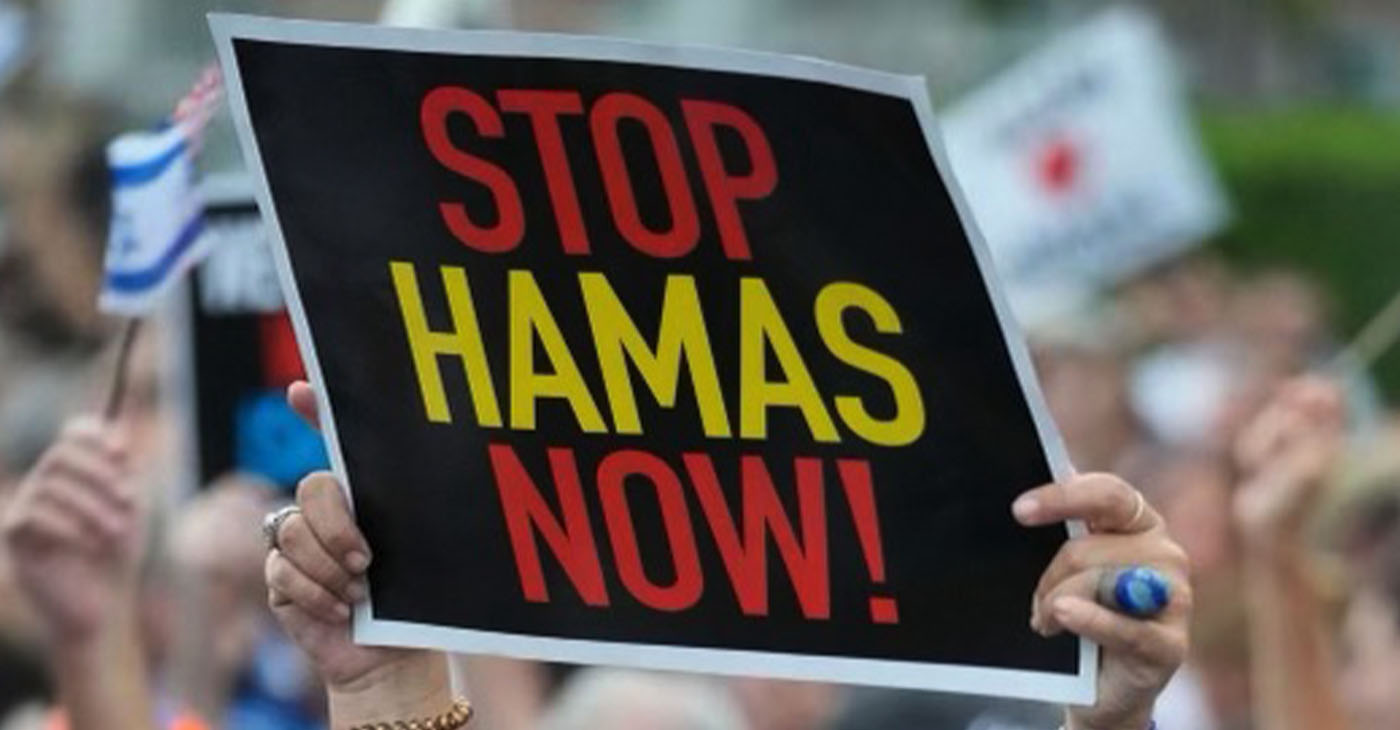
By Joe W. Bowers Jr.
California Black Media
OPINION
On Oct. 7, 2023, Hamas terrorists crossed the Israel-Gaza border and indiscriminately slaughtered Israeli civilians in their homes.
They killed nearly 300 young people at a music festival and took at least 200 hostages including 30 children. The atrocities they committed included massacres of families, abduction of the elderly and children, burning of babies and rapes of women.
The horrific surprise attack deserves universal and unequivocal condemnation. President Joe Biden called what Hamas did “an act of sheer evil” and pledged to defend the lives of Israelis and Jewish Americans.
He said, “Let there be no doubt. The United States has Israel’s back. We’ll make sure the Jewish and democratic state of Israel can defend itself today, tomorrow, as we always have.”
Hamas killed approximately 1,400 people including 32 Americans. Citizens from 40 different countries including the United Kingdom, France, Mexico, and Thailand were killed or reported missing.
Hamas fighters breached Israel’s border defenses on the final day of Sukkot while soldiers were away due to the holiday and launched attacks on 22 towns outside the Gaza Strip. This security lapse has been described as a catastrophic failure of Israel’s intelligence agencies..
Hamas is an extremist Islamist militant organization that has governed the Gaza Strip since 2007. It is recognized as an Iranian-backed terrorist group by the U.S. and the European Union and has a long history of violence against Jews and Palestinians, the latter of whom they often use as human shields.
While there have been plenty of groups who have unequivocally condemned the massacres, there are a number who haven’t, including organizations such as the Democratic Socialists of America (DSA), Black Alliance for Peace, Red Nation, and independent Black Lives Matter (BLM) chapters (excluding the national Black Lives Matter Global Network Foundation).
The DSA San Francisco chapter put out a statement on Oct. 9 that said, “Socialists support the Palestinian people’s, and all people’s, right to resist and fight for their own liberation. This weekend’s events are no different.”
Student organizations at a number of universities and colleges in California signed a solidarity statement titled “Resistance Uprising in Gaza” from Students for Justice in Palestine (SJP). The statement attributes the violence of the Hamas attack to what it refers to as Israeli apartheid and occupation.
The SJP statement written by Bears for Palestine at UC Berkeley says, “We support the resistance, we support the liberation movement, and we indisputably support the Uprising.” Essentially, these students are indirectly associating themselves with Hamas’ barbaric acts under the guise of “resistance.”
Signing the statement were 51 student organizations including those from Stanford, UC Berkeley, UCLA, UC Davis, UC San Diego, CSU Sacramento, and USC.
A statement signed by 34 Harvard student organizations said, “We, the undersigned student organizations, hold the Israeli regime entirely responsible for all unfolding violence.”
Many university leaders, where these students are enrolled, have been guilty of failing to unequivocally condemn Hamas and for inadequately addressing their students’ expressed support for Hamas.
Several Stanford faculty members, including three Nobel laureates, condemned Stanford’s administrators’ weak response to acts of terrorism and the expression of pro-Hamas sentiments by students on campus.
Israel unilaterally withdrew from Gaza in 2005. It dismantled 21 Israeli settlements in the territory and handed them over to the Palestinian Authority.
The assault by Hamas on Oct. 7 was not an ordinary clash with Israel. Hamas’ actions resulted in the deadliest single day for Jews since the Holocaust.
While there are valid reasons for protesting Israel’s treatment of Palestinians and a real reckoning with the Israeli government on its policies is long overdue, nothing justifies Hamas’ attack.
Israelis who were killed largely had nothing to do with the conditions of Palestinians in Gaza. Some of the victims weren’t even Israeli — they were just tourists.
The students blaming Israel for the atrocities committed by Hamas have faced criticism. Some groups have withdrawn their endorsements because of the backlash aimed at them. Others have doubled down on their activism. SJP held a “National Day of Resistance” on several campuses.
Several CEOs have asked Harvard to disclose a list of members from the organizations assigning responsibility to Israel to insure they do not hire any of their members. A Berkeley law professor has also urged firms not to hire his students who have publicly blamed Israel for the war.
This California Black Media report was supported in whole or in part by funding provided by the State of California, administered by the California State Library.
-

 Activism4 weeks ago
Activism4 weeks agoOakland Post: Week of March 20 – 26, 2024
-

 #NNPA BlackPress3 weeks ago
#NNPA BlackPress3 weeks agoCOMMENTARY: D.C. Crime Bill Fails to Address Root Causes of Violence and Incarceration
-

 #NNPA BlackPress3 weeks ago
#NNPA BlackPress3 weeks agoMayor, City Council President React to May 31 Closing of Birmingham-Southern College
-

 #NNPA BlackPress3 weeks ago
#NNPA BlackPress3 weeks agoFrom Raids to Revelations: The Dark Turn in Sean ‘Diddy’ Combs’ Saga
-

 #NNPA BlackPress3 weeks ago
#NNPA BlackPress3 weeks agoCOMMENTARY: Lady Day and The Lights!
-

 #NNPA BlackPress3 weeks ago
#NNPA BlackPress3 weeks agoBaltimore Key Bridge Catastrophe: A City’s Heartbreak and a Nation’s Alarm
-

 #NNPA BlackPress3 weeks ago
#NNPA BlackPress3 weeks agoBaltimore’s Key Bridge Struck by Ship, Collapses into Water
-

 Activism3 weeks ago
Activism3 weeks agoOakland Post: Week of March 27 – April 2, 2024

